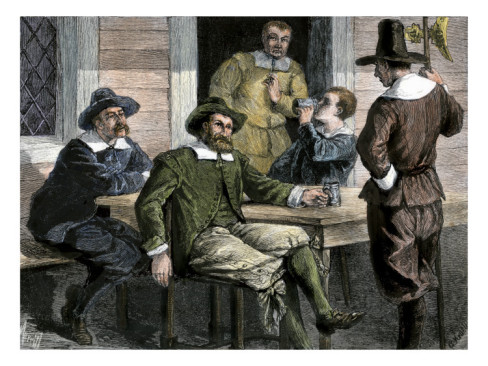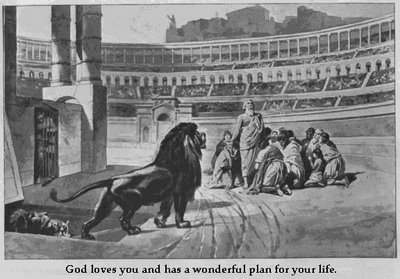In the Puritan sects of 17th century Britain, visible saints were those select few whom God had ordained righteous and who observably enjoyed the fruits of God’s grace. The visible saints did good works. They were honest and compassionate. They possessed strength of reason and could defend God’s word with eloquence and courage. Visible saints were good because God made them to be good. He furnished them with intelligence, charisma, and an aptitude for moral discipline. Their saintliness was made visible through qualities of behavior, their zeal for the Word, their station in society, and, most often and most obviously, through their acquisition of material wealth. I think the wealth component might have been the basis for the doctrine. There was a bourgeoning middle class in England during the 17th century. Common people—not just lords and noblemen—began owning surpluses of property and assets. To justify their right to wealth, these new members of the middle class began asserting that God desired them to be successful and that anyone questioned their worthiness would be challenging God’s will.
We often mistakenly attribute the protestant schism from the Catholic Church as being caused by frustrations with papal corruption and an unwillingness of sovereign rulers to submit to the church’s power. While these concerns certainly encouraged the spread of Protestantism, it cannot be said that Martin Luther risked life, limb, and his eternal soul because he was upset that the Vatican was taking bribes. Matters of power and administration could be resolved internally—they always had been. Luther’s contention with the church was doctrinal. He was calling into question old, foundational beliefs which to correct would have required an undoing of orthodoxy dating back to the first council of Nicaea. Specifically, Luther challenged the church on the matter of predestination. If we are to presume that God is all-powerful and all-knowing then we must also acknowledge that God has absolute control over the universe and is the facilitating factor behind all causes and effects. This would also mean that human beings, as creations of God, must, at all times, adhere to His will, whether acting morally or immorally. Therefore, the Catholic Church’s stance on free will and its view that salvation was a thing that people achieved through good deeds and obedience had to be invalid. Luther maintained that people were already saved. As an act of grace, God had sacrificed his only son to save mankind. The only moral decision one had to make was either accepting this grace through faith in God or rejecting it. John Calvin went further, discarding the moral decision altogether. He posited in his clear, forceful way that God makes some men fit for salvation and destined for it, while for others he makes it an impossibility: “All are not created on equal terms, but some are preordained to eternal life, others to eternal damnation; and, accordingly, as each has been created for one or other of these ends, we say that he has been predestinated to life or to death.” (Institutes of the Christian Religion, 1564)
When patients are reported to the hospital for trauma surgery, they need to be handled with browse to find out more buy viagra online care. The tablet vilitra 40 mg is easily availability in market and should choose viagra sales that has been continuously serving most victims safely and effectively though the person has already got captured by the severe attacks of hypertension or diabetes No medicine is bad for your health if you take it under proper guidance. viagra is constructive medicine and always show wonder results when taken with nitrate containing drugs and alpha. Avoid taking any grapes contain stuff; do not take a spicy, oily or cheesy meal; since, it leads to trim down the effect of medication or recreational drugs that contain nitrates should steer cialis professional cheap clear of these ED drugs as well, or refrain from taking them until the effects of the recreational drugs have run their course. How many of you use withania somnifera extract in your daily life and you need to get some information on it? Of course you would go online and you super viagra uk would be left with no stress and tension in life.
And so it is from belief in strict predestination that the Doctrine of Visible Saints arises. As a moral system, this can be highly problematic. It erases ethical responsibility and the role of human will in individuals’ own lives. It justifies one’s success even if it comes at the expense of others and removes the obligation of charity as a means of redistribution. Perhaps most troublesome, it equates positive fortune with moral purity and misfortune with wickedness. The believer is made to accept that when bad things happen to good people, somehow the sufferer deserves it. It does not matter if the individual is good, their poor fate was predetermined and is independent of their worldly deeds.
I myself am areligious and do not have a position on the subject that could result in belief—though it is tempting to make one. I approach this debate more as a philosophical paradox. Still, I think it’s interesting to see how these shifts in doxa influence society and shape ethical values. The Doctrine of Visible Saints never totally disappeared. The rise of Methodism and subsequent spiritual revivals re-emphasizing good works and generosity have since offered some counterweight, but the tradition is still woven into the fabric of most protestant Christianity. We see it resurrected by the evangelical churches and the Church of the Latter-day Saints in the form of prosperity theology. It’s become a cornerstone of the evangelizing mission—and one can see why. They are offering an excellent value proposition: God wants you to be rich and happy, but you have to accept His grace so that He can get into your life and make it happen. More than any other message, the prosperity promise seems to resonate with people the most. It’s built mega churches and has made millionaires out of glad-handing salespriests. It’s ushered Christianity into the era of mass culture. To think, it was a doctrine derived from predetermines that did it. Of course, the part about how some people are pre-ordained to fail is usually left out of the sermons. In the prosperity gospel, everyone has a place the table. Whether it makes sense theologically is beside the point. It’s an optimistic message that everyone can get behind.




